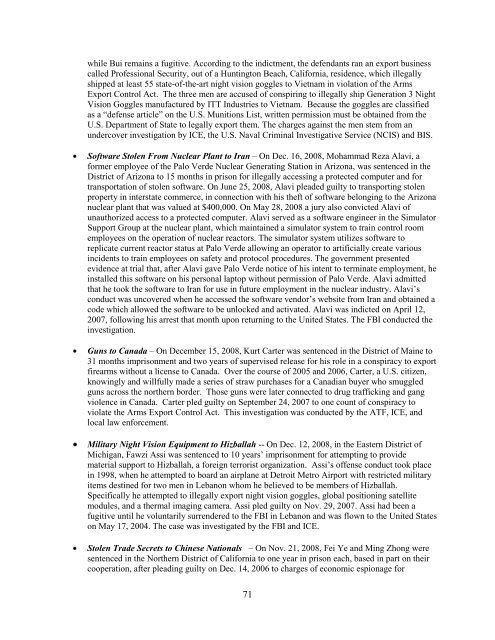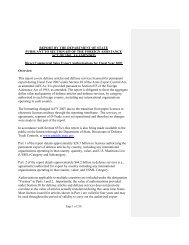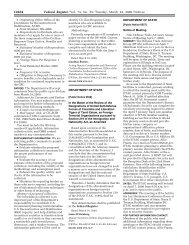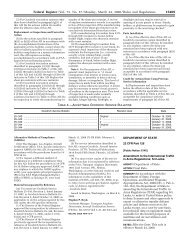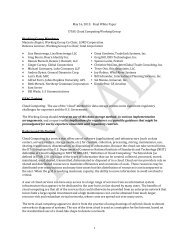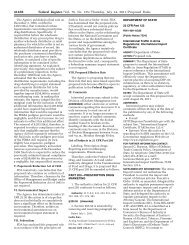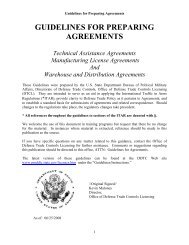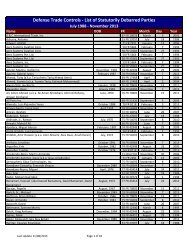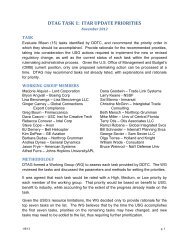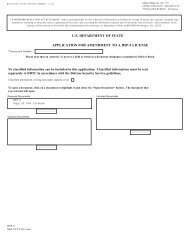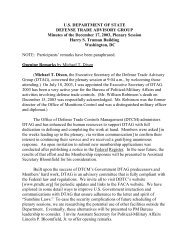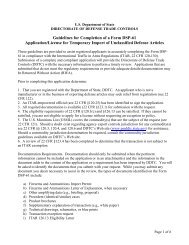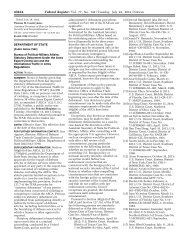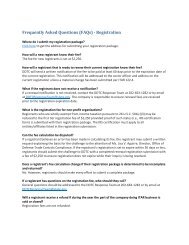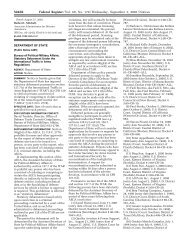Major Export Enforcement Cases - Directorate of Defense Trade ...
Major Export Enforcement Cases - Directorate of Defense Trade ...
Major Export Enforcement Cases - Directorate of Defense Trade ...
Create successful ePaper yourself
Turn your PDF publications into a flip-book with our unique Google optimized e-Paper software.
while Bui remains a fugitive. According to the indictment, the defendants ran an export business<br />
called Pr<strong>of</strong>essional Security, out <strong>of</strong> a Huntington Beach, California, residence, which illegally<br />
shipped at least 55 state-<strong>of</strong>-the-art night vision goggles to Vietnam in violation <strong>of</strong> the Arms<br />
<strong>Export</strong> Control Act. The three men are accused <strong>of</strong> conspiring to illegally ship Generation 3 Night<br />
Vision Goggles manufactured by ITT Industries to Vietnam. Because the goggles are classified<br />
as a “defense article” on the U.S. Munitions List, written permission must be obtained from the<br />
U.S. Department <strong>of</strong> State to legally export them. The charges against the men stem from an<br />
undercover investigation by ICE, the U.S. Naval Criminal Investigative Service (NCIS) and BIS.<br />
S<strong>of</strong>tware Stolen From Nuclear Plant to Iran – On Dec. 16, 2008, Mohammad Reza Alavi, a<br />
former employee <strong>of</strong> the Palo Verde Nuclear Generating Station in Arizona, was sentenced in the<br />
District <strong>of</strong> Arizona to 15 months in prison for illegally accessing a protected computer and for<br />
transportation <strong>of</strong> stolen s<strong>of</strong>tware. On June 25, 2008, Alavi pleaded guilty to transporting stolen<br />
property in interstate commerce, in connection with his theft <strong>of</strong> s<strong>of</strong>tware belonging to the Arizona<br />
nuclear plant that was valued at $400,000. On May 28, 2008 a jury also convicted Alavi <strong>of</strong><br />
unauthorized access to a protected computer. Alavi served as a s<strong>of</strong>tware engineer in the Simulator<br />
Support Group at the nuclear plant, which maintained a simulator system to train control room<br />
employees on the operation <strong>of</strong> nuclear reactors. The simulator system utilizes s<strong>of</strong>tware to<br />
replicate current reactor status at Palo Verde allowing an operator to artificially create various<br />
incidents to train employees on safety and protocol procedures. The government presented<br />
evidence at trial that, after Alavi gave Palo Verde notice <strong>of</strong> his intent to terminate employment, he<br />
installed this s<strong>of</strong>tware on his personal laptop without permission <strong>of</strong> Palo Verde. Alavi admitted<br />
that he took the s<strong>of</strong>tware to Iran for use in future employment in the nuclear industry. Alavi’s<br />
conduct was uncovered when he accessed the s<strong>of</strong>tware vendor’s website from Iran and obtained a<br />
code which allowed the s<strong>of</strong>tware to be unlocked and activated. Alavi was indicted on April 12,<br />
2007, following his arrest that month upon returning to the United States. The FBI conducted the<br />
investigation.<br />
Guns to Canada – On December 15, 2008, Kurt Carter was sentenced in the District <strong>of</strong> Maine to<br />
31 months imprisonment and two years <strong>of</strong> supervised release for his role in a conspiracy to export<br />
firearms without a license to Canada. Over the course <strong>of</strong> 2005 and 2006, Carter, a U.S. citizen,<br />
knowingly and willfully made a series <strong>of</strong> straw purchases for a Canadian buyer who smuggled<br />
guns across the northern border. Those guns were later connected to drug trafficking and gang<br />
violence in Canada. Carter pled guilty on September 24, 2007 to one count <strong>of</strong> conspiracy to<br />
violate the Arms <strong>Export</strong> Control Act. This investigation was conducted by the ATF, ICE, and<br />
local law enforcement.<br />
Military Night Vision Equipment to Hizballah -- On Dec. 12, 2008, in the Eastern District <strong>of</strong><br />
Michigan, Fawzi Assi was sentenced to 10 years’ imprisonment for attempting to provide<br />
material support to Hizballah, a foreign terrorist organization. Assi’s <strong>of</strong>fense conduct took place<br />
in 1998, when he attempted to board an airplane at Detroit Metro Airport with restricted military<br />
items destined for two men in Lebanon whom he believed to be members <strong>of</strong> Hizballah.<br />
Specifically he attempted to illegally export night vision goggles, global positioning satellite<br />
modules, and a thermal imaging camera. Assi pled guilty on Nov. 29, 2007. Assi had been a<br />
fugitive until he voluntarily surrendered to the FBI in Lebanon and was flown to the United States<br />
on May 17, 2004. The case was investigated by the FBI and ICE.<br />
Stolen <strong>Trade</strong> Secrets to Chinese Nationals – On Nov. 21, 2008, Fei Ye and Ming Zhong were<br />
sentenced in the Northern District <strong>of</strong> California to one year in prison each, based in part on their<br />
cooperation, after pleading guilty on Dec. 14, 2006 to charges <strong>of</strong> economic espionage for<br />
71


